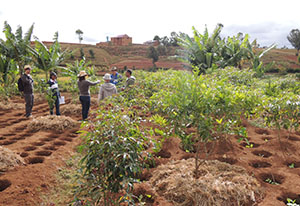 Soil ecological function restoration to enhance agrosystem services in rainfed rice cropping systems in agroecological transition
Soil ecological function restoration to enhance agrosystem services in rainfed rice cropping systems in agroecological transition
In the current context of climate change, food insecurity, population growth, negative impact on environment and natural resources, and loss of biodiversity, agriculture is rapidly changing. A great importance is now given to ecological processes occurring within agrosystems, in what is called agroecology.
Generally, agroecological practices are based on the manipulation of the aboveground biodiversity, on the management of organic matter as the main source of nutrients, and on the reduction of soil tillage. Little attention is given to soil ecological processes (i.e. soil functions) and the belowground biodiversity in agricultural practices despite their recognized high potential to enhance ecosystem service delivery and promote multiple ecosystem functions simultaneously.
Soil function restoration (SFR) is most relevant for tropical smallholder farmers developing their crops on fragile and poor soils, with low available chemical inputs and under climate change.
Aims
Our project aims to provide SFR practices based on local and scientific knowledge, in order to increase both agronomic, socio-economic and ecological performances of agroecological agrosystems. We explicitly aim to
• assess local knowledge and farmers' interventions on SFR,
• improve our scientific knowledge of SFR on diverse plant functions,
• test at field level various SFR practices based on farmers' and scientists' knowledge,
• evaluate the impact of SFR practices in terms of agronomic, socio-economic and ecological performances, and
• disseminate our results, mainly through a web platform on SFR practices for farmers and stakeholders, on knowledge on soil functioning in agroecology for students, on indicators of soil functioning for scientists and users.
Strategy
Our project focuses on rainfed rice cropping systems in the Highlands of Madagascar, rice being a major crop in the World, in the tropics and especially in Madagascar. Our approach combining local and scientific knowledges is relevant to ensure the dissemination of adoptable SFR practices to farmers. The measurement of agronomic, socio-economic and ecological performances is also original and will allow us to propose the ‘best’ practices to farmers.
The project will be based on a multi-disciplinary consortium located in Madagascar. Two sites in Madagascar will be considered, both in the Highlands and differing in climate, soil and farming practices; both are studied in on-going projects by our consortium.
A better inclusion in tropical agroecological systems of SFR practices based on traditional and scientific knowledge will likely improve agronomic performances and the provision of agrosystem services ensuring Human well-being such as nutrient cycling, carbon sequestration, farmer’s livelihood, and food security.
Keywords:
Soil functional biodiversity; Agroecological performances; Co-learning and dissemination; Local farmer’s knowledge; Madagascar
Date
2017-2020
Partners
- UMR Eco&Sols, Agap, Innovation, Selmet AIDA
- Université d’Antananarivo (Laboratoire des Radioisotopes)
- FOFIFA
Funds
Labex Agro Agropolis fondation
Contact and Informations
Eric Blanchart, UMR Eco&Sols, IRD Montpellier
email :






